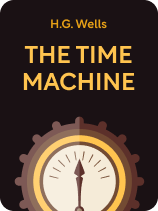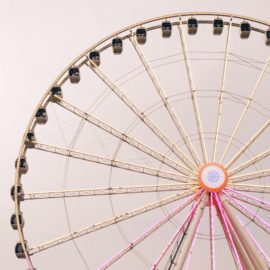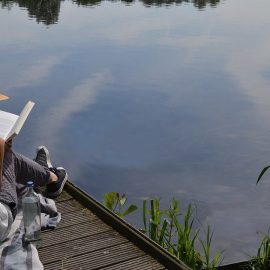

This article is an excerpt from the Shortform book guide to "The Time Machine" by H.G. Wells. Shortform has the world's best summaries and analyses of books you should be reading.
Like this article? Sign up for a free trial here.
In The Time Machine, what aspect of humanity “had committed suicide”? Why did humanity grow weaker over time? What’s the significance of the two flowers?
The Time Machine is a science fiction classic that tells the story of a Victorian scientist who builds a machine that can travel through time. In the distant future he finds that, rather than advancing, human civilization has collapsed.
Continue reading for a few quotes from The Time Machine that provide insights into the book’s profound ideas.
Quotes From The Time Machine
H.G. Wells’s classic story still captures people’s imaginations well over 100 years after its publication. We’ve collected a few representative quotes from The Time Machine and provided them along with some context and explanation.
“I grieved to think how brief the dream of the human intellect had been. It had committed suicide.”
The Time Traveller goes to the distant future, where he finds that humanity has evolved into two separate species—the childlike Eloi and the bestial Morlocks. Creativity is a distinctly human trait that neither the Eloi nor the Morlocks display. In A First-Rate Madness, psychiatrist Nassir Ghaemi defines creativity as the ability to identify problems that others haven’t noticed and to come up with innovative solutions for those problems. However, the Eloi and the Morlocks don’t seem to innovate at all—they just follow routines and become frightened or angry when something disrupts those routines.
Why couldn’t these new species keep society and culture from falling apart (or, alternatively, why didn’t they)? The loss of creativity would explain it. If humanity somehow lost the ability to be creative—to identify new problems and devise solutions for them—all progress would stop. Without creativity, at best we could only keep society as it currently is. In fact, that’s exactly what the Morlocks do: They keep the ventilation system working and take care of the Eloi, but there are no signs of them trying to invent or discover new things. Furthermore, if new problems arose without people recognizing or solving them, civilization would eventually decay and collapse just as Wells describes.
“We should strive to welcome change and challenges, because they are what help us grow. Without them we grow weak like the Eloi in comfort and security. We need to constantly be challenging ourselves in order to strengthen our character and increase our intelligence.”
The Time Traveller meets a group of people called the Eloi. The Eloi are only about four feet tall and very slender, with little muscle. There are no signs of disease among the Eloi population, and none of them seem to have jobs. The Time Traveller senses that the Eloi aren’t very smart, contrary to his assumption that people in the future would be advanced and intelligent. He hypothesizes that the lack of hardship over many generations has made them this way; without any challenges to overcome, the Eloi have no need for physical strength or intelligence.
“And I have by me, for my comfort, two strange white flowers—shriveled now, and brown and flat and brittle—to witness that, even when mind and strength had gone, gratitude and a mutual tenderness still lived on in the heart of men.”
After his first journey, the Time Traveller lands his machine on the same date he’d started from, at about eight o’clock in the evening. He hears the sounds of the dinner party happening just outside his laboratory, so he greets his guests, cleans himself up, and joins them.
The Time Traveller tells the dinner guests about his journey through time and adds that he doesn’t expect them to believe him. So, as evidence of his travels, the Time Traveller places two strange white flowers—a gift from Weena (an Eloi)—on the table.
The narrator is deeply upset by what he’d heard about the end of humanity and, later, the end of the world. His only comfort is the two flowers from Weena, which he kept for himself after the Time Traveller left on his second journey. To the narrator, the flowers symbolize the fact that people will always have the capacity for love and gratitude, even after they’ve lost everything else that makes them human.

———End of Preview———
Like what you just read? Read the rest of the world's best book summary and analysis of H.G. Wells's "The Time Machine" at Shortform.
Here's what you'll find in our full The Time Machine summary:
- An overview and analysis of H.G. Wells's 1895 science fiction novel
- A look at the science behind the story—what's real and what's fiction
- The literary techniques and symbolism Wells used to craft the story






